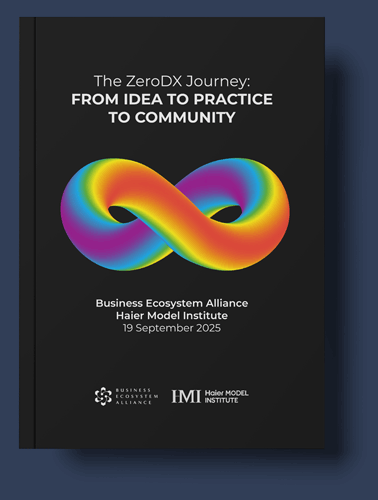Quantum Management is Chinese Management
by Danah Zohar
I want to introduce Quantum Management Theory and argue that it is, in essence, Chinese Management Theory. Quantum Management Theory, which I first introduced in the late 1990’s and have been developing further in these following years, is inspired by, and draws its main principles from, the defining ideas and principles of quantum physics. These same principles are the basis of traditional Chinese thought. Making this clear can both provide a modern, scientific access to China’s great cultural heritage, and lay the foundations of characteristically Chinese management practices.
Readers may ask, at first, “What can quantum physics have to do with management?”, but in fact, all modern management theory has been an attempt to use the laws of physics as a model and guide for the best way to manage companies and other human social systems. When Isaac Newton published his three laws of motion in the early 17th century, he promised that mankind now had the tools to know everything, predict everything, and control everything. The power, simplicity, and promise of this new mechanical physics caught the imagination of every major thinker in every field of human social thought for the next three hundred years.
Sigmund Freud wanted to be the Newton of psychology, August Compte the Newton of sociology, John Locke and John Stuart Mill the Newtons of a new democratic social vision, and Adam Smith the Newton of a new capitalist economics. Both Weber’s bureaucracy and Marx’s immutable laws of history were inspired by Newton’s physics, and in management thinking, the Scottish engineer Frederick Taylor based his new “Scientific Management Theory” on Newton’s model for the universe. New, machine-based technologies were conceived using Newton’s physics, and “Taylorism” became the management Bible of great companies that thrived in a new Industrial Age.
But Newton’s physics has now been replaced by quantum physics. The Industrial Age is well behind us, and the world in which business operates today is not simple, law-abiding and predictable. The realities facing 21st century business are complex, chaotic, uncertain, and globally interconnected. The machines of heavy industry have been replaced by the silicon chips of digital technology, by nanotechnology, laser technology, super-conductors, new materials science, etc. All these new technologies are quantum technologies. We live in a new Quantum Age, and yet companies are still being organized and managed by Newtonian/Taylorian principles originating in the 17th century.
I simply argue that, as our understanding of nature and the universe has changed radically, and the nature of the world in which business operates today has changed radically, the principles with which we frame our management thinking must also change quite radically. Companies simply cannot succeed as isolated, static, ruthlessly self-interested systems encumbered by heavy, top-down, bureaucratic control in a dynamic and interdependent world requiring flexible, adaptive strategies and win/win, cooperative relationships with customers and competitors. It is time for business-as-usual, Taylorian management to be replaced by business-for-the-future, Quantum Management, and China is well-positioned to take the lead with this.
Western scientists discovered quantum physics at the beginning of the 20th century, but they have never understood it. Einstein was outraged by this new science he helped to found, describing it as “absurd”, “schizophrenic”, and “Alice-in-Wonderland physics”. The Danish scientist Niels Bohr, another founding father of quantum physics, had to look to the Chinese I Ching and to Chinese yin/yang principles to find models that could help him describe his own discoveries. Chinese culture and Chinese thought, including the I Ching, the Dao De Ching, Confucian virtue ethics, and the thought of Neo-Confucianists like Zhu Xi and Wang Yangming, have been quantum for over two thousand years. Indeed, we could say that quantum physics is just Chinese thought expressed in equations and verified by experiments.
I believe this natural quantum nature of the Chinese mind will give China a competitive advantage in the 21st century. In the following paragraphs, I will make my case by describing the similarities between quantum thinking and traditional Chinese thinking, and how both can help companies thrive by adopting Quantum Management.
- Newton described a mechanical, universe made of matter and ruled by iron, deterministic laws. Indeed, he described the universe as a “giant, clockwork machine”, and Taylorian management followed suit by portraying companies as well-oiled machines best organized by rigid bureaucratic structures. But both Chinese thinkers and quantum physics say that the universe is made of energy, and that it is a spontaneous, dynamic system, continuously evolving and reinventing itself. Quantum Management describes quantum organizations as bottom-up, dynamic energy systems capable of continuous innovation, and calls for the removal of bureaucratic structures that stifle communication (energy flow) and flexibility.
- Newton’s universe is ruled by laws of action and reaction that produce the same results in all situations and contexts. Every action is a reaction to some previous action. The bureaucratic Taylorian company is reactive, always reacting in a controlled and predetermined way to unforeseen developments in the market. Both the Dao in Chinese thought, and the laws of physics themselves in quantum science, are creatively responsive, always spontaneously adapting to the context in which they are operating. The agile quantum organization is always sensitive to its surrounding environment and relationships, and responds spontaneously and adaptively to surrounding events and changes in market conditions and preferences.
- Newton said the material universe is made of isolated, atomistic bits, each atom occupying a separate place in space and time. The Taylorian company is divided into isolated, siloed functional units, each ignorant of what others are doing, and all controlled from the top in a pyramidal power structure. Chinese thinkers have argued that the universe is a complex web of relationships, and place emphasis on the social and strategic importance of making good relationships. Chinese thought is by nature holistic. Everything is connected to everything, all parts contain the whole. Quantum physics says the universe is holistic, that everything is “entangled” with everything else, and that it is relationships that create reality. The quantum organization is a living system, a network of multi-functional, collaborating teams working cooperatively in a co-creative ecosystem of further and wider relationships.
- Newton’s physics is dualistic, emphasizing a sharp distinction and distance between the observer and the observed. Observers are just passive witnesses to predetermined events. In the Taylorian company, employees are just passive tools or instruments of production, having no say in how the company is run and told simply to follow the rules. Customers just get whatever the company decides offer. Both Chinese thought and quantum physics say that the observer (subject) and the observed (object) cannot be separated. They describe a “participative universe” in which the observer and what he observes are complementary partners in a dynamic, co-creative process of mutual evolution. Quantum observers make the world. In a quantum company, employees are co-creative partners whose work and decisions make the company. At Haier, the first company to fully implement Quantum Management, every employee is a leader, and customers are co-creative partners in company innovation.
- Newton’s physics is either/or. Polarities are opposite. Entities are either particles or waves, and there is only one way that a series of actions can unfold. In the Taylorian company, you are either a manager who gives orders or an employee who takes orders, and every decision is either good or There is always one best decision, one best strategy. Both Chinese thought and quantum physics are both/and. For Chinese thinkers, all processes, situations, and thoughts contain complementary polarities, both yin and yang. In quantum physics, entities are both particle-like and wave-like, at the same time, and there are also always many ways from “A” to “B”. In quantum companies, people are both leaders and employees, a decision or strategy can be both good and bad, depending on the context, and the company always explores multiple possibilities – many possible strategies, products, processes, and relationships.
- And, finally, Newton’s physics is amoral. There is no moral goal to the laws of his physics, no “good” or “bad” in the deterministic interactions between atoms. And the Taylorian company is equally amoral (and frequently immoral). The goal for all its strategies and activities is simply to maximize profit. The Taylorian company is an island onto itself, responsible to no one but its shareholders, and oblivious to any resulting damage to society or the environment. But both the Heaven of Chinese thought, and the universe of quantum physics have a moral dimension. The Dao works to establish harmony between Heaven and Earth, and human beings have liangzi, “moral intuition” that guides them in bringing this harmony to human relationships and affairs. The laws of quantum physics operate to ensure cosmic coherence, the constant creation of new, “harmonious” (viable) relationships. The quantum company functions as a “complex adaptive system”, a living quantum system, and the governing principles of the company seek to establish harmonious mutual benefit between leaders, employees, shareholders, society, and the earth’s environment.
Chinese modernizers have felt they need to learn from the West, and it is true that western science and technology have been more advanced. But learning from western strengths does not mean copying western weaknesses and mistakes. The very Newtonian thinking that made the West strong during the Industrial Age is the same thinking responsible for western decline in the 21st century. Today’s problems and opportunities are not simple, linear, or isolated, and they cannot be addressed with 17th century Newtonian thinking. Complexity, non-linearity, and systemic interconnectedness are best addressed with quantum thinking, and that is Chinese thinking. Chinese companies wanting to thrive in this new Quantum Age should not be relying on outdated Taylorian management practices favored by now struggling western companies. Instead, Chinese business leaders should have the confidence to believe in the contemporary advantages of their own culture, and in the kind of thinking they have always known best. They should adopt Quantum Management, which is distinctively Chinese management.
Danah Zohar is a guest professor at Tsinghua University and the China Art Academy, and a Haier entrepreneurial mentor. She is the author of The Quantum Leader and The Quantum Self. Her new book is Zero Distance: The Tao of Quantum Management.


